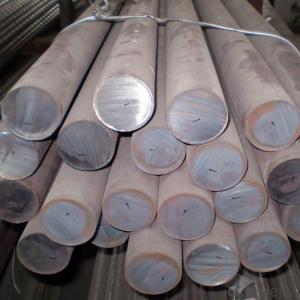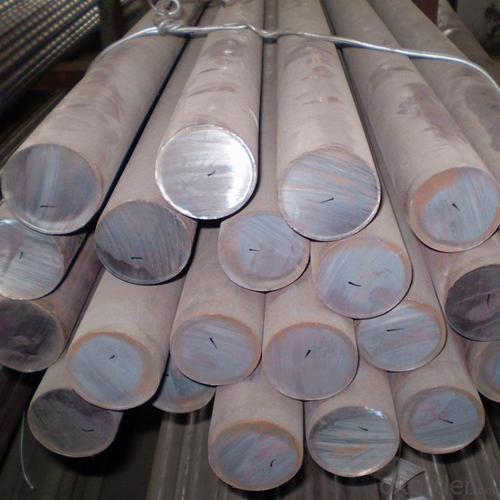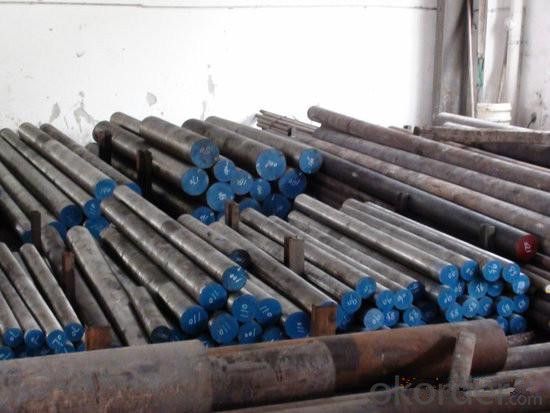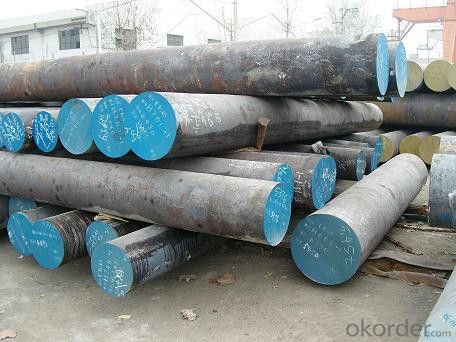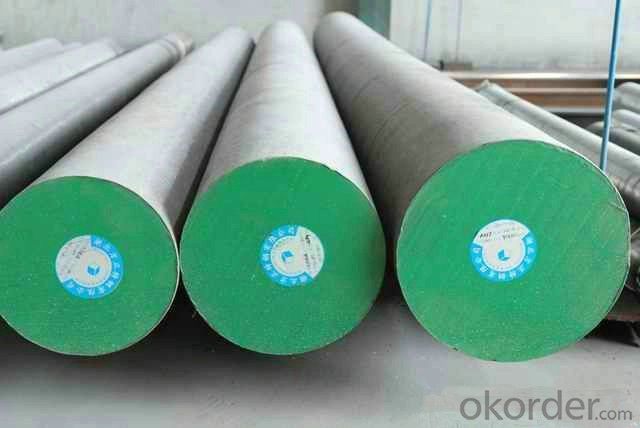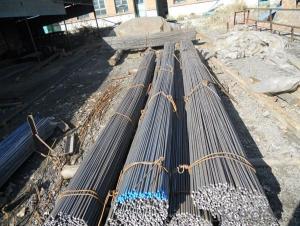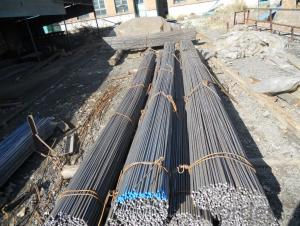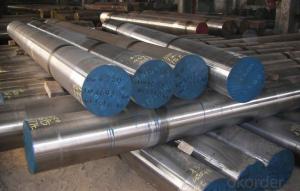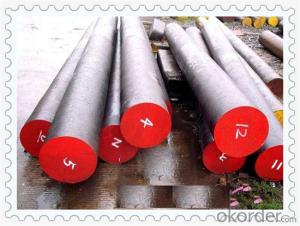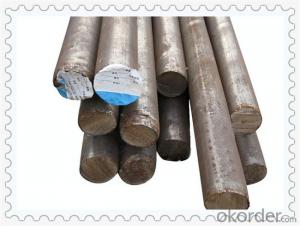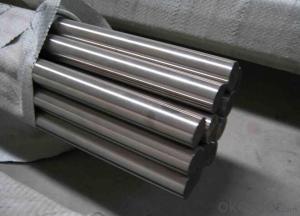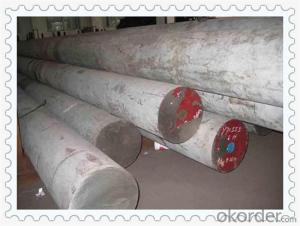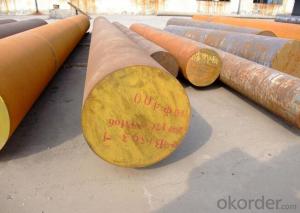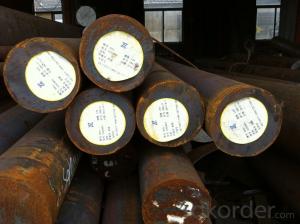Alloy Steel Round Bars 42CrMo4
- Loading Port:
- Shanghai
- Payment Terms:
- TT OR LC
- Min Order Qty:
- 30 m.t.
- Supply Capability:
- 120000 m.t./month
OKorder Service Pledge
OKorder Financial Service
You Might Also Like
Alloy Steel Round Bars 42CrMo4
Specification
1, Diameter: 8mm-250mm rounds
5mm-9mm rods
2, Length: 2m, 3m, 5.8m, 6m or customized
3, Standard: GB, ASTM, AISI, SAE, DIN, JIS, EN
OEM technology - send detailed technical parameters for accurate quotation.
2, Produce Process: smelt iron - EAF smelt billet - ESR smelt billet -
hot rolled or forged to get the steel round bar and plate
3, Heat Treatment: annealing, normalizing, tempering, quenching
4, Surface Treatment: Black, Polished, Galvanized
5, Quality Assurance: We accept third party inspection for all orders.
You can ask testing organizations such as SGS, BV, etc. to test our products before shipping.
Equivalent grades
| GB | DIN | AISI | JIS |
| 42CrMo | 1.7225 | 4140 | SCM440 |
Chemical Composition
| C | Si | Mn | Cr | Mo | P | S |
| 0.38-0.43 | 0.40max | 0.60-0.90 | 0.90-1.20 | 0.15-0.30 | ≤0.035 | ≤0.035 |
Products Show
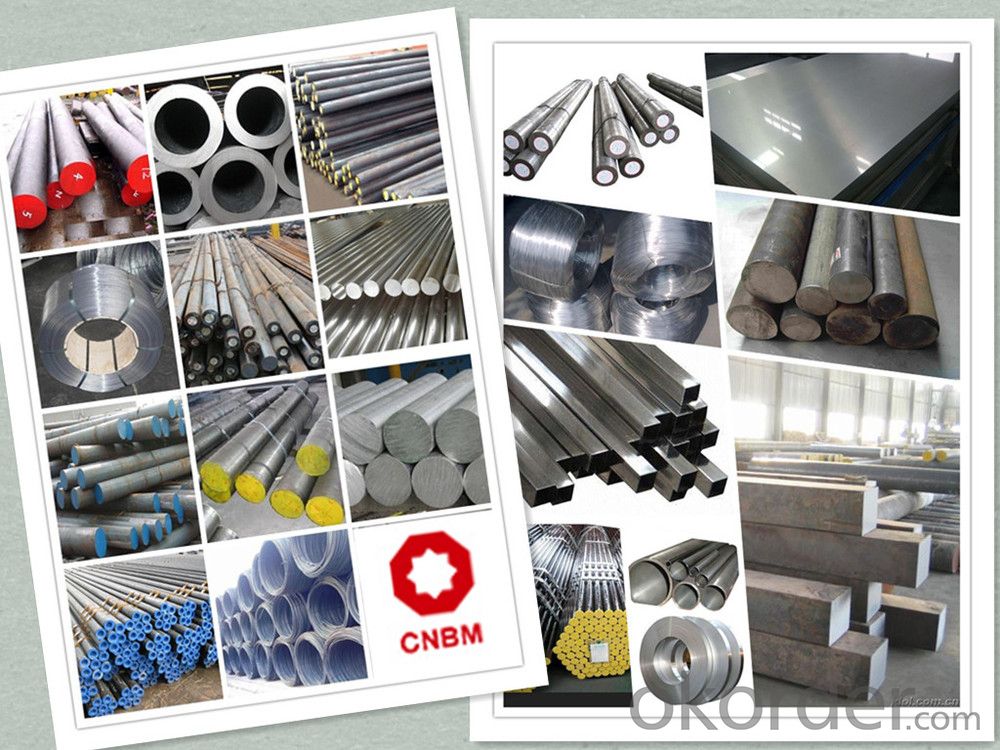
Application
| Carbon Steel | Mold bottom, Plastic mold, Construction machinery parts Automobile parts, Security grills, Screens, Construction |
| Bearing Steel | Aerospace, Navigation, Nuclear energy, Chemical industry Electronic information, Petrochemical, Instrument and meter Transportation |
| Cr-Mo Steel | Mechanism & Fasteners gear, Stressed components for vehicles Engines and machines, Parts of larger cross-section |
| Gear Steel | All kinds of gears, Statically and dynamically stressed component for vehicles Engines and machine, Larger cross-section parts, Crankshafts |
Work Shop
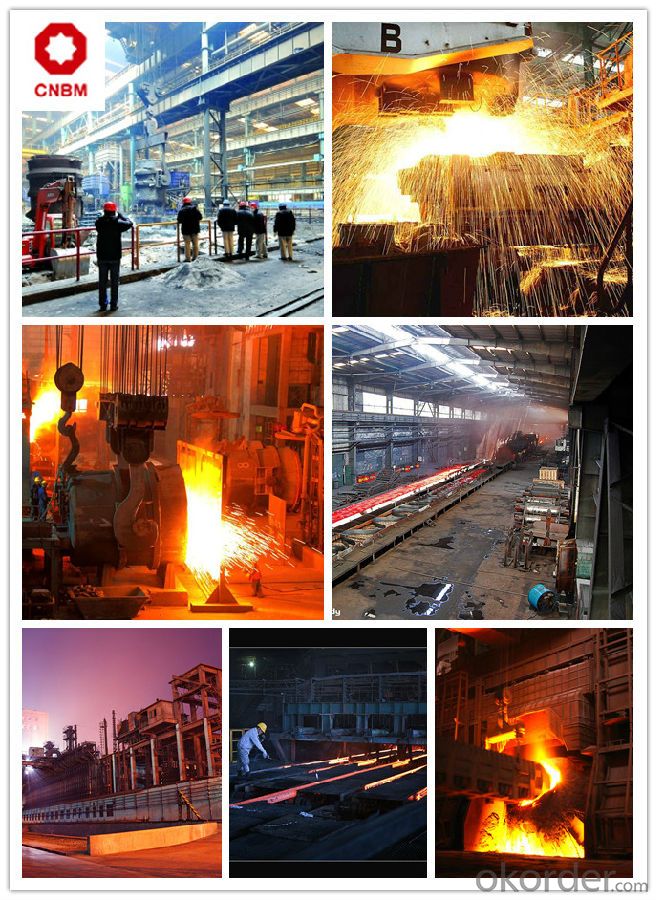
Company Information
CNBM International Corporation is the most important trading platform of CNBM group.
Whith its advantages, CNBM International are mainly concentrate on Cement, Glass, Iron and Steel, Ceramics industries and devotes herself for supplying high qulity series of refractories as well as technical consultancies and logistics solutions.

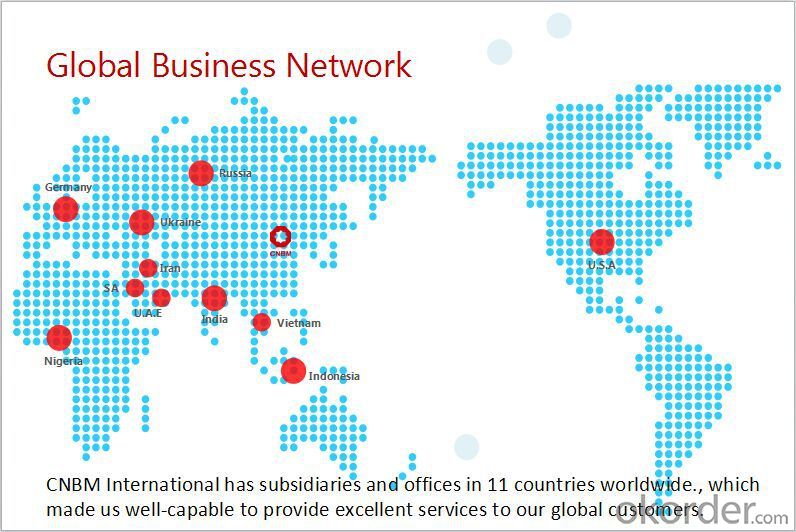
FAQ
1, Your advantages?
professional products inquiry, products knowledge train (for agents), smooth goods delivery, excellent customer solution proposale
2, Test & Certificate?
SGS test is available, customer inspection before shipping is welcome, third party inspection is no problem
3, Factory or Trading Company?
CNBM is a trading company but we have so many protocol factories and CNBM works as a trading department of these factories. Also CNBM is the holding company of many factories.
4, Payment Terms?
30% TT as deposit and 70% before delivery.
Irrevocable L/C at sight.
5, Trading Terms?
EXW, FOB, CIF, FFR, CNF
6, After-sale Service?
CNBM provides the services and support you need for every step of our cooperation. We're the business partner you can trust.
For any problem, please kindly contact us at any your convenient time.
We'll reply you in our first priority within 24 hours.
Packaging & Delivery
1, Packaging: seaworthy package or as required
2, Delivery: 35-45 days or based on quantity
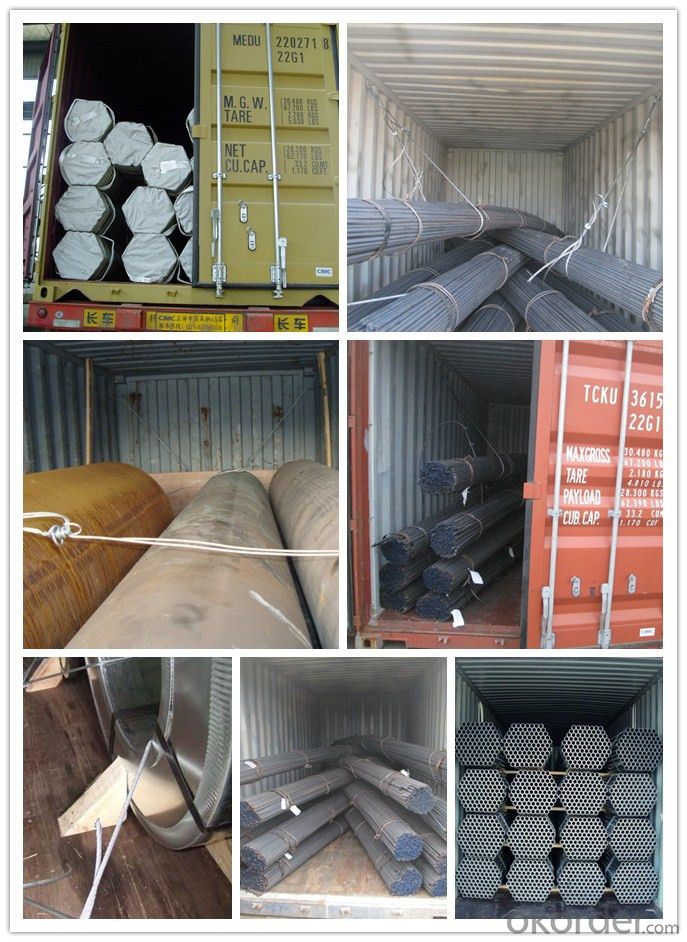
- Q: What are the common alloying elements used in steel round bars?
- The common alloying elements used in steel round bars are carbon, manganese, silicon, and sometimes chromium, nickel, and molybdenum.
- Q: What is the difference between a rough turned and a polished steel round bar?
- A rough turned steel round bar has undergone a preliminary machining process that removes surface imperfections and excess material, providing a slightly smoother finish. On the other hand, a polished steel round bar has undergone further polishing or grinding processes to achieve a much smoother and aesthetically appealing surface finish.
- Q: What are the advantages of using vanadium-alloy steel round bars?
- There are several advantages of using vanadium-alloy steel round bars. Firstly, vanadium increases the strength and toughness of the steel, making it highly durable and resistant to wear and tear. This makes it ideal for applications that require high strength and reliability, such as construction, automotive, and machinery industries. Secondly, vanadium-alloy steel has excellent heat resistance, allowing it to withstand high temperatures without losing its mechanical properties. This makes it suitable for use in environments with elevated temperatures or in applications involving heat treatment processes. Lastly, vanadium-alloy steel offers improved corrosion resistance, reducing the risk of rust and corrosion, and increasing the lifespan of the round bars. Overall, the use of vanadium-alloy steel round bars provides enhanced performance, durability, and reliability, making them a preferred choice in various industrial applications.
- Q: How do steel round bars perform under torsion or twisting forces?
- Steel round bars are known for their excellent performance under torsion or twisting forces. Due to their inherent strength and stiffness, steel round bars are capable of withstanding high levels of torque without significant deformation or failure. When subjected to torsion, steel round bars exhibit a phenomenon known as elastic behavior. Initially, the bar will twist and deform elastically, meaning it will return to its original shape once the twisting forces are removed. This elastic deformation is proportional to the applied torque, following Hooke's law. However, if the torsional forces exceed the elastic limit of the steel round bar, it will undergo plastic deformation. This means that the bar will permanently twist and will not return to its original shape once the forces are released. The amount of plastic deformation depends on the magnitude and duration of the torsional forces. Steel round bars are highly resistant to torsional failure due to their high tensile strength, which allows them to withstand significant twisting forces. Additionally, the smooth and uniform surface of the round bars reduces the likelihood of stress concentrations, further enhancing their torsional performance. It is important to note that the performance of steel round bars under torsion can be influenced by factors such as alloy composition, heat treatment, and manufacturing processes. By selecting suitable grades of steel and employing appropriate processing techniques, the torsional strength and performance of steel round bars can be further optimized to meet specific application requirements.
- Q: How do you straighten steel round bars?
- Steel round bars can be straightened by using a hydraulic straightening press or by applying heat and pressure to the bent section until it regains its original shape.
- Q: What are the applications of steel round bars in the aerospace industry?
- Steel round bars have various applications in the aerospace industry, primarily due to their high strength-to-weight ratio and excellent resistance to corrosion. They are commonly used in the construction of aircraft frames, landing gear components, and engine parts. Additionally, steel round bars are employed in the production of critical structural elements, such as wing spars and fuselage sections, ensuring the durability and safety of aerospace vehicles.
- Q: Can steel round bars be recycled?
- Yes, steel round bars can be recycled. Steel is a highly recyclable material, and this includes steel round bars. Recycling steel round bars involves collecting the scrap material, melting it down, and then reshaping it into new steel products. This process can be done repeatedly without compromising the quality or strength of the steel. Recycling steel round bars not only conserves natural resources but also reduces energy consumption and greenhouse gas emissions compared to producing new steel. It is an environmentally friendly option that helps to promote sustainability and reduce waste.
- Q: What is the machinability of a steel round bar?
- The ease with which a steel round bar can be shaped, cut, and modified using machining processes determines its machinability. This property measures how easily the steel material can be worked on with tools like lathes, mills, drills, and cutting or shaping tools. Several factors influence the machinability of a steel round bar, including its chemical composition, microstructure, and any heat treatment it has undergone. Elements like sulfur, phosphorus, and lead can either enhance or hinder machinability, while alloying elements like chromium, molybdenum, and nickel can also have an impact. Steel round bars with high machinability are characterized by their ability to be easily cut, drilled, and shaped with minimal tool wear and power consumption. They also produce smooth, precise finishes with minimal surface defects. On the other hand, low machinability steel round bars are more challenging to work with and may require more power, specialized tools, and slower cutting speeds. Considering the machinability of a steel round bar is important when selecting materials for machining applications. Factors like desired cutting speed, tool life, surface finish, and overall machining efficiency should be taken into account. The specific machining operations, such as turning, milling, or drilling, will also influence the choice of steel round bar with suitable machinability. In conclusion, the machinability of a steel round bar is a crucial factor in determining its suitability for various machining processes. Understanding the machinability characteristics of different steel grades can help in selecting the most appropriate material for specific machining applications, ensuring efficient and effective machining operations.
- Q: What are the typical dimensions of a steel round bar?
- The typical dimensions of a steel round bar can vary depending on the specific application and industry requirements. However, in general, steel round bars are commonly available in diameter sizes ranging from 1/4 inch to 24 inches. These dimensions are often measured in increments of 1/8 inch or 1/4 inch. The length of a steel round bar is typically standardized at 20 feet, although shorter lengths may also be available. It is important to note that these dimensions can vary significantly depending on the specific grade and type of steel being used, as well as the manufacturing process. Therefore, it is essential to consult the appropriate industry standards or consult with a supplier to determine the exact dimensions needed for a particular project.
- Q: Weight algorithm of round steel
- Round steel weight = density * volume = density * base area * length of round bar.Round steel is a solid strip of steel whose cross section is round. Its specifications are expressed in diameter, in units of millimeters (mm), such as "50mm", which means a diameter of 50 millimeters of round steel.
Send your message to us
Alloy Steel Round Bars 42CrMo4
- Loading Port:
- Shanghai
- Payment Terms:
- TT OR LC
- Min Order Qty:
- 30 m.t.
- Supply Capability:
- 120000 m.t./month
OKorder Service Pledge
OKorder Financial Service
Similar products
Hot products
Hot Searches
Related keywords
